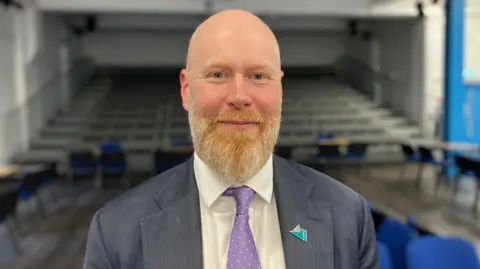MPs say fix Send system or face ‘lost generation’
 Rachel Morgan
Rachel MorganUrgent action is needed to stop a “lost generation” of children leaving school without ever getting the support they need for their special educational needs and disabilities (Send), MPs have warned.
In a highly critical report, the Public Accounts Committee (PAC) found a Send system “in disarray”, “mired in red tape, lacking funding, and failing to produce value for money”.
An estimated 1.7 million school-aged children have special education needs and disabilities in England.
The Department for Education (DfE) said the government was “making progress” on the issue with a £1bn investment in Send.
Most Send children, who require more educational support than their peers, are taught in mainstream schools.
Those with further needs can get legal entitlement to more specific support, often in a specialist school, via an education, health and care plan (EHCP).
The report from the committee, which scrutinises public spending, said there were 576,000 children with an EHCP in January 2024.
One of them is Rachel Morgan’s seven-year-old son Max, who has autism and ADHD.
 Rachel Morgan
Rachel MorganMum Rachel, from Birmingham, said Max missed much of his schooling during a “never-ending battle” to get support for him, but that he was now “brimming with confidence” in a specialist school.
Despite that, the lack of specialist places means the school is a 45-minute journey away.
PAC chairman Sir Geoffrey Clifton-Brown said parents who were seeking Send support for their children faced a “chaotic” system.
“The immensity of this situation cannot be overstated,” he said.
“As a nation, we are failing countless children. We have been doing so for years.
“This is an emergency that has been allowed to run and run. This report must serve as a line in the sand for government.”
The committee’s report found demand for EHCPs had soared by 140% in the last decade – but that the government did not fully understand why, which limited the system’s ability to cope with demand.
It also found many councils failed to provide EHCPs for children who need them within the 20-week timeframe required by law.
And there were huge regional differences between local authority areas providing EHCPs on time, creating a “postcode lottery” for families.
Many councils were also facing huge financial deficits because of overspending on their Send budgets, the report said.
It warned 40% of councils would be “staring down bankruptcy” next year, when a scheme allowing local authorities to keep those deficits off their financial books expires.
Current “piecemeal interventions” were doing nothing to improve the sustainability of the system, which was in urgent need of reform, the report said.
Councillor Arooj Shah, from the Local Government Association, which represents councils across England, called for councils’ spending deficits on Send to be “written off”.
‘Culture of belonging’
One of the report’s recommendations to government was to explain how mainstream schools can be more inclusive for Send pupils.
The government recently announced £740m for schools to adapt their buildings to make them more accessible.
Ninestiles, an academy in Birmingham, has 45 Send pupils based in a specialist resource centre at the school.
They spend approximately 70% of their time in mainstream education and 30% in specialist lessons.
Principal Alex Hughes said a “really inclusive environment” was central to a “culture of belonging” at the school.
 Vanessa Clarke / BBC
Vanessa Clarke / BBCHe said the system’s focus should be on “celebrating the brilliant contributions” Send pupils can make to their schools, but added that many families had struggled to find support for their children.
Councillor Roger Gough, from the County Councils Network, which represents councils in England, said the report was the latest which showed the Send system was “no longer viable”.
Daniel Kebede, general secretary of the National Education Union, said the committee had highlighted “the full drastic extent of the crisis in Send”.
Schools Minister Catherine McKinnell said the system had been “failing families with Send children for far too long”.
“These problems are deep-rooted and will take time to fix, but we remain steadfast in our commitment to deliver the change that exhausted families are crying out for by ensuring better earlier intervention and inclusion,” she added.








